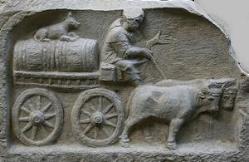- Quelle Buck: Hanf ahd. hanaf. 1294 hanfgarten, hanfgarto, 1320 Hanfbünda.
Amer, Ammer, Amber, Amper, Ambrach für Flußnamen, vordeutsch. Vgl. sanskr. ambu Wasser, lat. imber Regen, irisch ambh Fluß. Stamm amb ...
- Quelle Härdl: Das bairische und österreichische Wort Hanafaß, hochdeutsch Hanf, Dialektbedeutung "Leinwandgewebe" , leitet seine Herkunft von dem lateinischen Wort cannabis,-is her, das bei Varro und anderen römischen Schriftstellern vorkommt, Ahd. wird das Wort zu "hanaf" Es ist also vor der ahd. Lautverschiebung entlehnt worden, weil das "c" zu "h" verschoben ist. Mhd. entwickelt sich das Wort zu "hanef" und schließlich zu unserem "Hanf". Der Hanf wird auch bei uns noch vereinzelt angebaut und aus den Hanffasern wird hauptsächlich Hanfgarn hergestellt.
- Quelle ist versiegt 02/2017 ... /freespace.virgin.net/bob.hall/content/welsh.htm
hafod or hafoty = summer dwelling, dwelling = wohnen, hendref = winter dwelling
- Quelle ist ebenfalls versiegt: www.accomodata.co.uk/wales10.htm
Hafod = a summer dwelling or summer pasture
Hafod-wen = fair summer dwelling or pasture
Hafod Fraith = mottled summer pasture.
- Quelle ist versiegt 02/2017: whr.bangor.ac.uk/pronounce.htm
A hafod, literally a "summer place" is traditionally an upland farm for summer grazing, worked in conjunction with a lowland hendre home farm for winter grazing. The application of the term hafod to some of the placenames given here is not entirely consistent with this, as Hafod y Llyn and Hafod Garegog are not far above sea level
- Quelle https://en.wikipedia.org/wiki/Hafod
The word hafod is Welsh for 'summer dwelling' (compare sheiling) or 'farm', and refers to the seasonal cycle of transhumance - the movement of livestock and people from a lowland winter pasture at the main residence (Welsh hendre) to a higher summer pasture from roughly May through October.
- Querverweis, siehe dazu auch
 Hafod unter Ortsnamen
Hafod unter Ortsnamen
